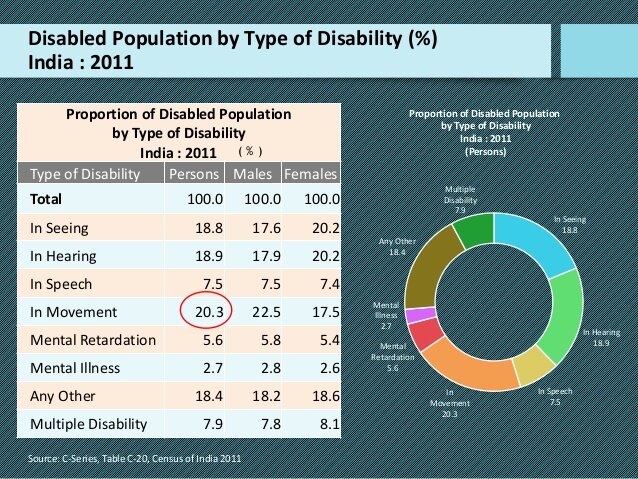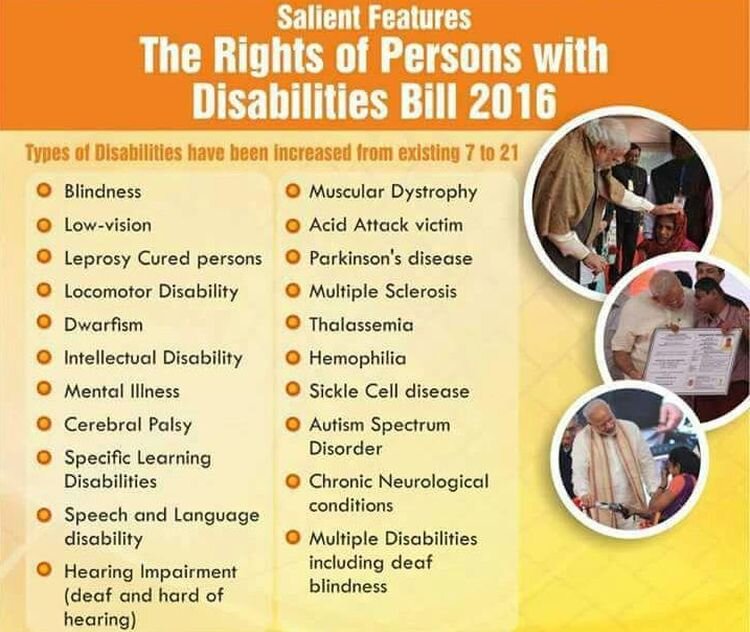Social Justice
Issues Related to Persons with Disability
- 09 Jan 2020
- 12 min read
Introduction
- Disabilities is an umbrella term, covering impairments, activity limitations, and participation restrictions.
- An impairment is a problem in body function or structure;
- An activity limitation is a difficulty encountered by an individual in executing a task or action;
- A participation restriction is a problem experienced by an individual in involvement in life situations.
- As per Census 2011, in India, out of the total population of 121 crore, about 2.68 Cr persons are ‘Disabled’ (2.21% of the total population)
- Out of 2.68 crore, 1.5 crore are males and 1.18 crore are females
- Majority (69%) of the disabled population resided in rural areas
Constitutional Frameworks for Disabled in India
- Article 41 of the Directive Principles of State Policy (DPSP) states that State shall make effective provision for securing right to work, to education and to public assistance in cases of unemployment, old age, sickness and disablement, within the limits of its economic capacity and development.
- The subject of ‘relief of the disabled and unemployable’ is specified in state list of the Seventh Schedule of the constitution.
Legislations for Disabled
Right of Persons with Disabilities Act 2016
- The Act replaces the Persons with Disabilities (Equal Opportunities, Protection of Rights and Full Participation) Act, 1995.
- "Person with disability" means a person with long term physical, mental, intellectual or sensory impairments which, in interaction with barriers, hinders his full and effective participation in society equally with others.
- "Person with benchmark disability" means a person with not less than 40% of a specified disability where specified disability has not been defined in measurable terms and includes a person with a disability where specified disability has been defined in measurable terms, as certified by the certifying authority.
- Disability has been defined based on an evolving and dynamic concept.
- Principles stated to be implemented for empowerment of persons with disabilities (PWD) are respect for the inherent dignity, individual autonomy including the freedom to make one's own choices, and independence of persons.The principle reflects a paradigm shift in thinking about disability from a social welfare concern to a human rights issue.
- The types of disabilities have been increased from 7 to 21. The act added mental illness, autism, spectrum disorder, cerebral palsy, muscular dystrophy, chronic neurological conditions, speech and language disability, thalassemia, hemophilia, sickle cell disease, multiple disabilities including deaf blindness, acid attack victims and Parkinson’s disease which were largely ignored in earlier act. In addition, the Government has been authorized to notify any other category of specified disability.
- It increases the quantum of reservation for people suffering from disabilities from 3% to 4% in government jobs and from 3% to 5% in higher education institutes.
- Every child with benchmark disability between the age group of 6 and 18 years shall have the right to free education. Government funded educational institutions as well as the government recognized institutions will have to provide inclusive education.
- Stress has been given to ensure accessibility in public buildings in a prescribed time frame along with Accessible India Campaign.
- The Chief Commissioner for Persons with Disabilities and the State Commissioners will act as regulatory bodies and Grievance Redressal agencies, monitoring implementation of the Act.
- A separate National and State Fund be created to provide financial support to persons with disabilities.
- The Bill provides for grant of guardianship by District Court under which there will be joint decision – making between the guardian and the persons with disabilities.
- The Chief Commissioner for Persons with Disabilities and the State Commissioners will act as regulatory bodies and Grievance Redressal agencies and also monitor implementation of the Act.
- The Bill provides for penalties for offences committed against persons with disabilities and also violation of the provisions of the new law.
- Special Courts will be designated in each district to handle cases concerning violation of rights of PwDs.
- The New Act will bring our law in line with the United National Convention on the Rights of Persons with Disabilities (UNCRPD), to which India is a signatory.
Programmes/initiatives for Disabled in India
- Accessible India Campaign : Creation of Accessible Environment for PwDs:
- A nation-wide flagship campaign for achieving universal accessibility that will enable persons with disabilities to gain access for equal opportunity and live independently and participate fully in all aspects of life in an inclusive society.
- The campaign targets at enhancing the accessibility of built environment, transport system and Information & communication ecosystem.
- DeenDayal Disabled Rehabilitation Scheme: Under the scheme financial assistance is provided to NGOs for providing various services to Persons with Disabilities, like special schools, vocational training centres, community based rehabilitation, pre-school and early intervention etc
- Assistance to Disabled Persons for Purchase / fitting of Aids and Appliances (ADIP): The Scheme aims at helping the disabled persons by bringing suitable, durable, scientifically-manufactured, modern, standard aids and appliances within their reach.
- National Fellowship for Students with Disabilities (RGMF)
- The scheme aims to increase opportunities to students with disabilities for pursuing higher education.
- Under the Scheme, 200 Fellowships per year are granted to students with disability.
- Schemes of the National Trust for the Welfare of Persons with Autism, Cerebral Palsy, Mental Retardation and Multiple Disabilities.
Issues and Challenges
- Health:
- A large number of disabilities are preventable, including those arising from medical issues during birth, maternal conditions, malnutrition, as well as accidents and injuries.
- However, the health sector especially in rural India has failed to react proactively to disability
- Further there are lack of affordable access to proper health care, aids and appliances
- Healthcare facilities and poorly trained health-workers in rehabilitation centres is another concern.
- Education:
- The education system is not inclusive. Inclusion of children with mild to moderate disabilities in regular schools has remained a major challenge.
- There are various issues such as availability special schools, access to schools, trained teachers, and availability of educational materials for the disabled.
- Further, reservations for the disabled in higher educational institutions has not been fulfilled in many instances
- Employment:
- Even though many disabled adults are capable of productive work, disabled adults have far lower employment rates than the general population.
- The situation is even worse in the private sector, where much less disabled are employed
- Accessibility: Physical accessibility in buildings, transportation, access to services etc still remain a major challenge.
- Discrimination/Social Exclusion:
- Negative attitudes held by the families of the disabled, and often the disabled themselves, hinder disabled persons from taking an active part in the family, community or workforce.
- Differently-abled people face discrimination in everyday life. People suffering from mental illness or mental retardation face the worst stigma and are subject to severe social exclusion.
- Inadequate data and statistics: The lack of rigorous and comparable data and statics further hinders inclusion of persons with disabilities. The major issues with collection of data and measuring disability are:
- Difficult to define disability
- Coverage: Different purposes require different disability data
- Reluctance in reporting disability as disability is considered to be a stigma in many places/societies
- Poor implementation of policies and schemes hinders the inclusion of disabled persons. Though various acts and schemes have been laid down with an aim to empower the disabled, their enforcement face many challenges.
Way Forward
- Prevention:
- Preventive health programs need to be strengthened and all children need to be screened at a young age.
- Kerala has already started an early prevention programme. Comprehensive Newborn Screening (CNS) programme seeks early identification of deficits in infants and reduce the state's burden of disability.
- Awareness:
- People with disabilities need to be better integrated into society by overcoming stigma
- There should be awareness campaigns to educate and aware people about different kinds of disability
- Success stories of people with disabilities can be showcased to inculcate positive attitude among people
- Employment:
- Disabled adults need to be empowered with employable skills
- The private sector needs to be encouraged to employ them.
- Better measurement: The scale of disability in India needs to be better understood by improving the measurement of disability.
- Education:
- State-wise strategies on education for children with special needs need to be devised.
- There should be proper teacher training to address the needs of differently-abled children and facilitate their inclusion in regular schools
- Further there should be more special schools and ensure educational material for differently-abled children
- Access:
- Safety measures like road safety, safety in residential areas, public transport system etc, should be taken up
- Further, it should be made legally binding to make buildings disabled-friendly
- Policy Interventions:
- More budgetary allocation for welfare of the disabled. There should be a disability budgeting on line of gender budget.
- Proper implementation of schemes should be ensured. There should be proper monitoring mechanisms and accountability of public funds.






